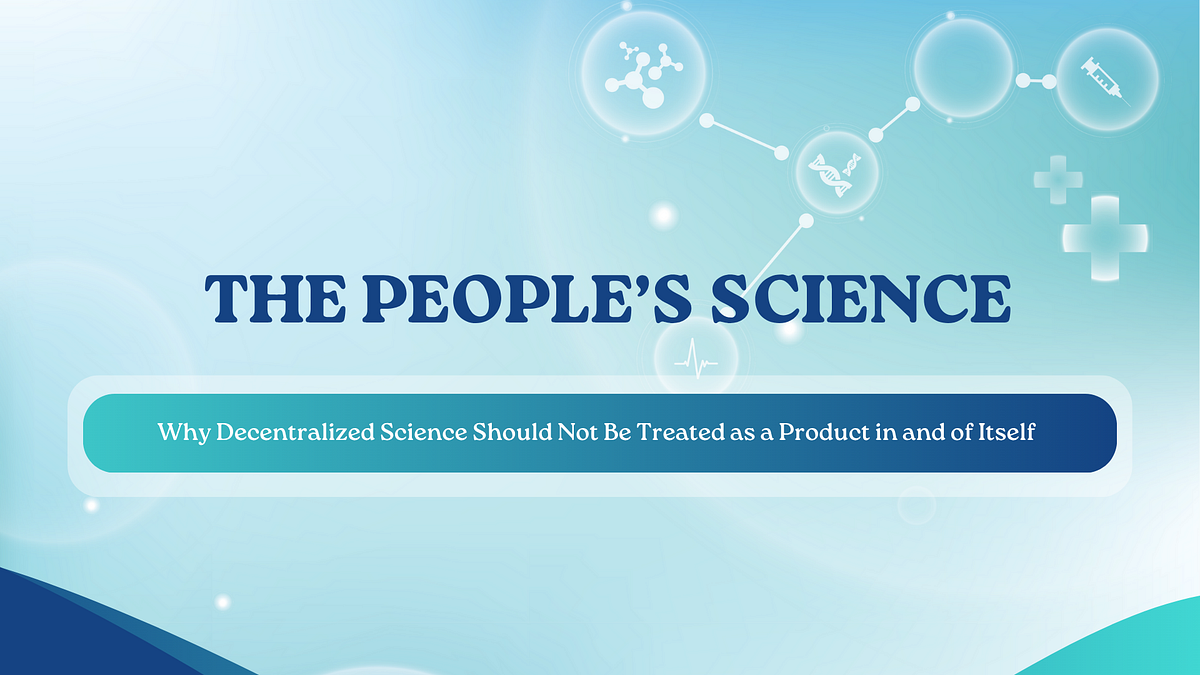DeSci: The People’s Science
Why Decentralized Science Should Not Be Treated as a Product in and of Itself
AI systems thrive on data. Every scroll, voice prompt, medical scan, or keystroke feeds the machine. Yet, the value generated is captured by centralized platforms, not the people. What this creates is a lopsided economy, where the many contribute, but only a few profit.
While this may seem like a uniquely digital problem, it is not.
Traditional science has long followed the same pattern. From unpaid lab assistants and PhD students, to research participants, field workers, and marginalized communities whose data or traditional knowledge is mined — science, too, has a legacy of invisible labor, and like the tech industry, has historically extracted value without redistributing it fairly.
The Promise of Decentralized Science
Decentralized Science (DeSci) offers a structural reconstruction of how science is done. It proposes a new paradigm, where the infrastructure of science is governed by and accountable to the people it serves.
However, one of the greatest challenges I have observed is the tendency to treat DeSci as just another Web3 product — something to speculate on, farm for tokens, or gamify with low-effort participation.
This tendency is especially prevalent in communities that adopt a compensation-first approach to participation, or those that focus on sheer volume of engagement without regard for its quality or depth.
When DeSci becomes just another shiny object for yield seekers, it risks replicating the very extractive structures it claims to disrupt. If we reduce decentralized science to a cluster of protocols and reward mechanisms, we lose the plot. The goal is not to build faster, shinier platforms. The goal is to rewrite the rules of participation, inclusion, and reward — to recognize everyone who contributes, and to make science more accessible, more just, and more sustainable.
What Then Does DeSci as a People’s Science Look Like?
- Science as infrastructure, built for communities of contributors and participants.
A people’s science does not revolve around monetizing participation or chasing market traction. It focuses on building shared infrastructure that serves the needs of the people marginalized by centralized systems. Circular Protocol embodies this by designing tools like iStamp for decentralized verification and C3rtify for ethical clinical trials — not as products to sell, but as public goods that restore integrity and access to science.
- Fair attribution and commensurate compensation for everyone in the value chain.
Science is rarely a solo endeavor. It is built by many hands — from the patients who share their data, to the analysts who process it, to the reviewers and researchers who shape its interpretation. Projects like BIO SYNQ DAO are creating open biomedical knowledge bases where those who contribute data, research, or insight are directly rewarded through transparent token-based mechanisms. This ensures that scientific value is not extracted from the many for the benefit of a few but shared across the entire value chain.
- Consent-based data sharing where people actually own and benefit from the data they generate.
In traditional systems, individuals have little to no control over how their medical or research data is used. DeSci insists that consent must be embedded from the beginning. Through secure systems like those being deployed with Arculus smartcards or the C3rtify trial platform, Circular Protocol ensures that data is not only private but governed by the people who produce it.
- Epistemic justice — valuing knowledge systems that have long been ignored.
A people’s science recognizes that not all knowledge comes from elite labs or established journals, and there is no single repository of absolute truth. Every discipline, every discovery, is shaped by perspective and perspectives vary. DeSci widens the lens to include indigenous knowledge, chronic illness communities, and alternative research spaces. Circular’s work with partners like MetaFlora, which supports research in historically marginalized fields like cannabis science, reflects a commitment to making space for what was previously excluded.
- Accountability and transparency, from the ground up.
People’s science must be legible to the people. That means building systems where funding flows, data access, research outcomes, and decisions can be audited in real time. Circular’s collaborations with tools like Baselight and NobleBlocks enable that kind of built-in transparency, ensuring that what is shared, who sees it, and how it is used are never hidden from public view.
DeSci is not a product. It is a chance to build science that remembers where the value comes from and gives it back. DeSci is the people’s science and Circular protocol is
Join the Circular ecosystem today:
Discord: https://discord.gg/circularprotocol
Telegram: https://t.me/CircularProtocol
Follow on X: https://x.com/circularweb3









































![[Honest Review] The 2026 Faucet Redlist: Why I'm Blacklisting Cointiply & Where I’m Moving My BCH](https://cdn.bulbapp.io/frontend/images/4b90c949-f023-424f-9331-42c28b565ab0/1)




